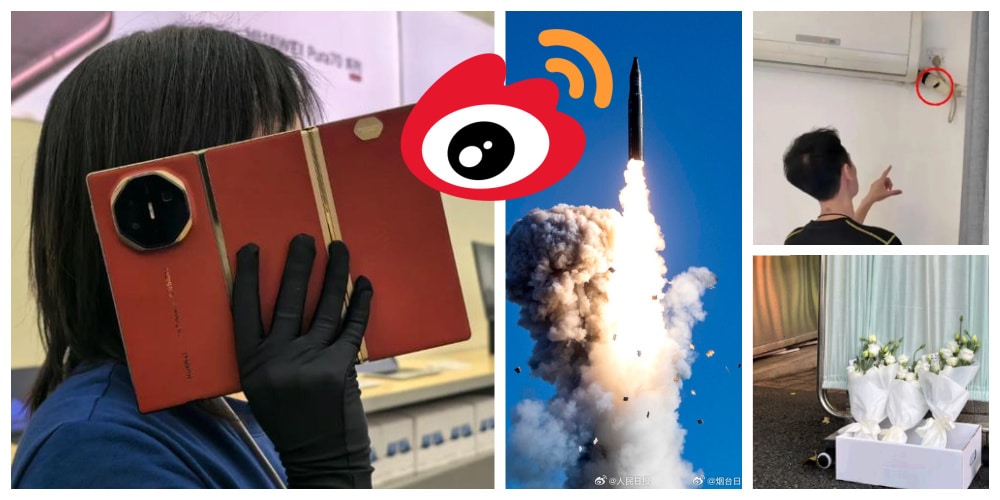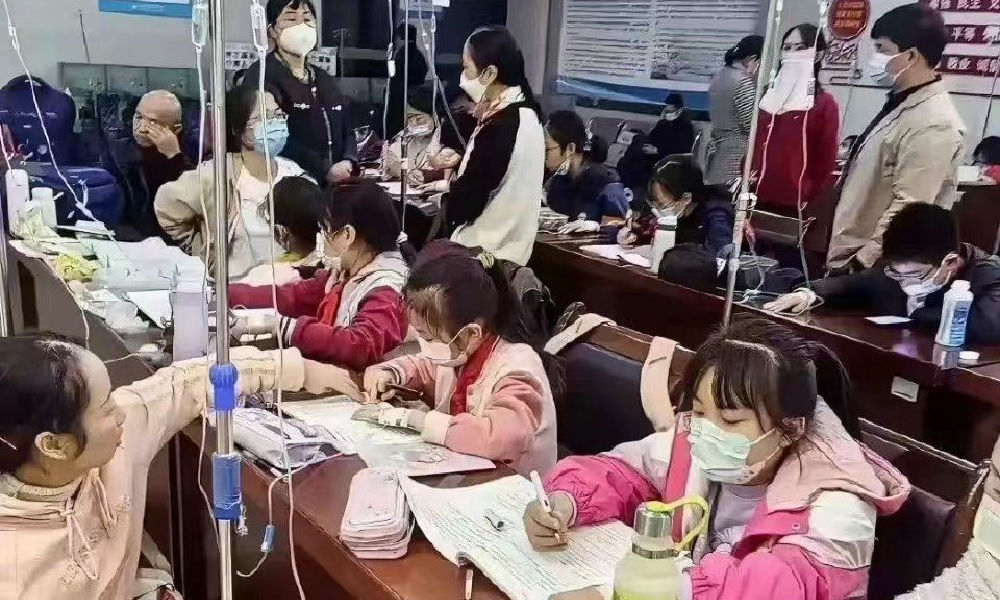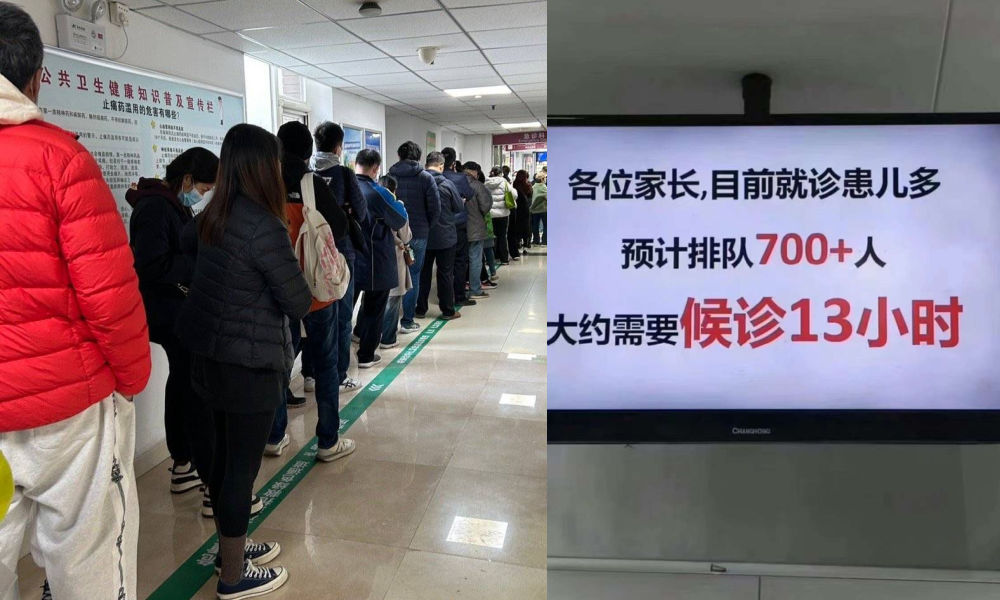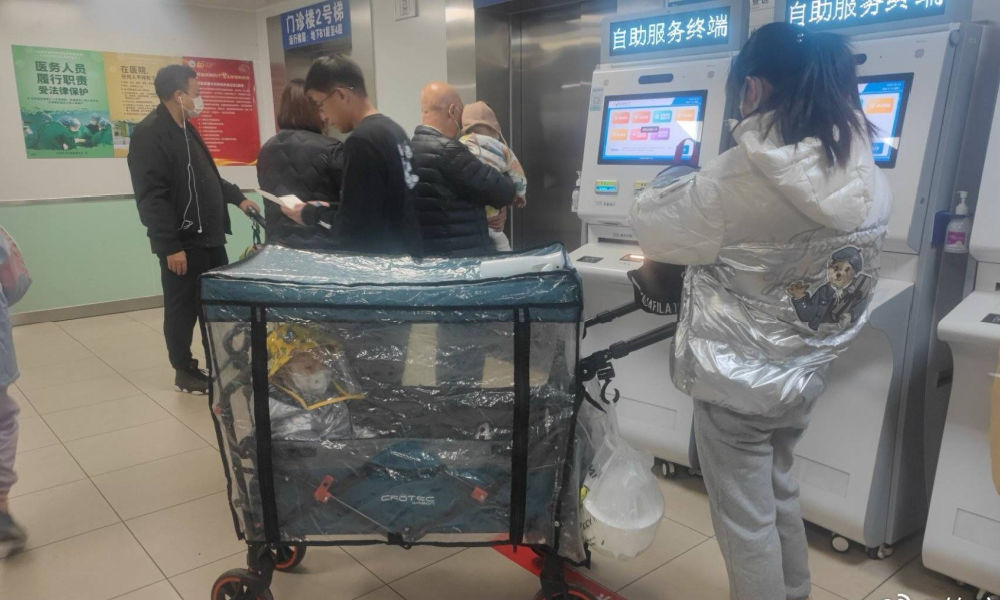China and Covid19
High Hopes, Sober Assessments: China’s COVID-19 Vaccines Discussed
Already successful or still a long way to go? Mixed news reports and discussions on China’s COVID-19 vaccine program.
Published
5 years agoon

There are strikingly different online discussions on China’s COVID-19 vaccine candidates. Some already think the vaccines are effective and about to be launched, while others are more apprehensive about the implementation of a successful program in the near future.
It takes time and global collaboration for a massive vaccination program against COVID-19 to succeed, according to Chinese top scientist Zhong Nanshan (钟南山).
On September 24th, the renowned pulmonologist stated that it will take up to two years to roll out a large-scale vaccine program.
Zhong made his sobering statements during the 13th China Bioindustry Convention (第十三届中国生物产业大会) on Thursday, where he joined the Wuhan event via an online connection.
These remarks, posted by a few media outlets on Weibo, are noteworthy in a social media context where China’s potential COVID-19 vaccines are presented as being in a highly advanced stage, leading to high hopes of a COVID-19 vaccine program launching in the very near future.
Already Proven Successful?
This week, various state media outlets, including CGTN, propagated the news that some Chinese vaccine candidates have already been proven to be effective during their clinical trials.

The published news, issued on Wednesday, September 23rd, led to the viral hashtag “Chinese COVID-19 Vaccine Proven to Be Successful” (#中国新冠疫苗已被证明有效#), which attracted over 480 million clicks on Weibo.
The hashtag was also used on Weibo in combination with a video showing renowned medical scientist Chen Wei (陈薇), visibly emotional, praising the efforts made in the development of a Chinese vaccine.
For the CanSino company, Chen Wei led a joint team over the past months in developing and registering an experimental COVID-19 vaccine. It was the first vaccine candidate to be approved for clinical trials. In state media, Chen is now described as the “She-power behind China’s first COVID-19 vaccine.”

CGTN
“Seeing her cry makes me want to cry,” some commenters said: “Our country is fantastic.” “I am so proud of China,” a typical comment said.
“I hope the people can get the vaccine as soon as possible,” some Weibo users said, with others also asking: “When can we get it?”
Any news on China’s social media about Chinese vaccines proven to be successful at this stage lead back to one statement allegedly made by WHO Chief Scientist Soumya Swaminathan during a World Health Organization media briefing on Monday, September 21st.
The hashtag “Chinese COVID-19 Vaccine Proven to Be Successful” (#中国新冠疫苗已被证明有效#) attracted 460 million clicks on Weibo this week, the news was hosted by the National Business Daily (每日经济新闻) quoting WHO Chief Scientist Soumya Swaminathan. But here’s the problem: pic.twitter.com/hStsjyN1sJ
— Manya Koetse (@manyapan) September 24, 2020
An edited clip of Swaminathan’s statement was published by CGTN, but looking back in the actual media briefing, the Chief Scientist can be heard saying “if some of their candidates prove to be successful,” rather than saying they have already been proven effective (see twitter thread above for the videos).
The quote by Swaminathan is as follows:
“We have been engaged in discussions with China for the last several months because, as you know, they also have a very active vaccine development program and several of the vaccine candidates are in advanced stages of clinical trials, so this is also of interest to us. We are following those very closely and we have had very constructive and open discussions with them and they have always been reiterating their commitment to global access if some of their candidates actually prove to be successful in the clinical trials that are going on.”
Promising Results
Despite the apparent confusion over Swaminathan’s remarks, there seems to be enough news on China’s ongoing vaccine research for people to be hopeful about the high-speed development of a safe and effective coronavirus vaccine.
China currently is among the major players in the international race to produce a COVID-19 vaccine. The country has eleven different vaccines in clinical trials, four of them in Phase III, meaning the vaccines’ safety and effectiveness is being tested on large patient groups.
Out of the four vaccines in this advanced stage, two belong to the state-owned pharmaceutical company Sinopharm (中国医药集团总公司), divided over the Wuhan Institute of Biological Products and the Beijing Institute of Biological Products.
Another vaccine belongs to Chinese vaccine company CanSino (康希诺生物), and the other to the Beijing-based biopharmaceutical company Sinovac (北京科兴生物制品有限公司).

News that an upcoming vaccine by China National Biotec Group (CNBG, subsidiary of the state-owned Sinopharm) would cost only 600 yuan ($88) for two doses, if given the green light, made its rounds on Weibo this week (#国内新冠疫苗两针600元#), many applauding the affordable price.
More positive updates on the development of a Chinese novel coronavirus vaccine are flooding social media on a daily basis (#新冠疫苗工作进展#).
On September 25, the chief epidemiologist of the Chinese Center for Disease Control and Prevention Zeng Guang (曾光) shared an update about the progress of the country’s vaccine work during a State Council Information Office conference. He stated that, although further research is still underway, China’s earliest vaccine subjects have maintained high levels of antibodies. The hashtag “Chinese Vaccines Possibly Provide Long-Term Protection” (#我国疫苗可能有比较长期的保护作用#) received over 160 million views on Weibo on Saturday.
“Emergency Use”
While research is still ongoing, tens of thousands of people in China have already been given vaccines as part of an “emergency use designation.”
The CanSino vaccine candidate (Ad5-nCoV) was approved to be given to members of the military by late June , followed by the approval in July to give the vaccine to those facing high infection risks, such as medical industry workers and border inspectors.
Two other vaccines by Sinovac (“CoronaVac”) and by Sinopharm were also given to thousands of people, including the employees of Sinovac and their families, after both being authorized for “emergency use” in late July.
Zhou Song (周颂), secretary for the Commission for Discipline Inspection with China National Biotec Group (most widely used in the emergency scheme), was quoted by SCMP earlier this month, saying: “Hundreds of thousands have taken the shot and no one has shown any obvious adverse effects or got infected.”
China’s National Health Commission official Zheng Zhongwei (郑忠伟) also stated at a news conference Friday that the vaccines used pose no risks: “Their safety can be ensured but their efficacy is yet to be determined.”

One of the info sheets about the COVID-19 vaccine shared by People’s Daily on Weibo.
According to Chinese state media outlet People’s Daily, common people could have access to COVID-19 vaccines as early as November or December of this year.
Sobering Statements
Amid all these positive news reports coming out in the Chinese media and being discussed on social media, the more sobering statements by Zhong Nanshan stand out.
The 83-year-old epidemiologist reportedly does not expect a large-scale vaccine program to roll out until at least one or two years from now. Zhong also stated that the virus will continue to exist and spread this winter and in the spring of next year.

Zhong Nanshan is a pulmonologist who played a key role during the SARS outbreak, gaining international recognition as the ‘SARS hero.’ In the fight against COVID-19, the respiratory expert was also involved in managing the crisis. He is often on point in assessing the situation at hand. In early March, Zhong said the COVID-19 pandemic would continue until well after June of this year.
In August, Zhong was nominated the Medal of the Republic (共和国勋章) for his contributions, China’s highest order of honor.
There are mixed responses to the various reports about China’s vaccine program on social media.
When there is news about the vaccines potentially coming out very soon, there is praise but also worry – Weibo users express concern about vaccine safety. Various medical scandals have added to mistrust of vaccines in China. “I am concerned about the side effects,” one popular comment said, with others replying that they were also worried about the overall risks of the vaccine.
News of a large-scale vaccine program potentially taking up to two years, however, is also met with criticism. “Do they want to lock up students for two years?!”, many people wrote, referring to the closed-off campus policies of Chinese universities. Some social media users seem confused: “First it’s three months, then six, now one year, maybe two?”
But many people are also not too worried, praising China’s efforts in containing COVID-19 and working on a vaccine. “It’s the reliability that counts,” they say.
The most recurring comments are those taking pride in what Chinese medical experts have accomplished thus far. “China has become a world leader when it comes to medical technology,” some state: “Trump can go to bed. China is the best!”
Read more about the new coronavirus in China here.
By Manya Koetse
Follow @WhatsOnWeibo
Original background of the featured image by Markus Winkler / @markuswinkler
Spotted a mistake or want to add something? Please let us know in comments below or email us. First-time commenters, please be patient – we will have to manually approve your comment before it appears.
©2020 Whatsonweibo. All rights reserved. Do not reproduce our content without permission – you can contact us at info@whatsonweibo.com.
Manya is the founder and editor-in-chief of What's on Weibo, offering independent analysis of social trends, online media, and digital culture in China for over a decade. Subscribe to gain access to content, including the Weibo Watch newsletter, which provides deeper insights into the China trends that matter. More about Manya at manyakoetse.com or follow on X.

China and Covid19
Weibo Watch: Small Earthquakes in Wuhan
How Wuhan is shaking off its past with a new wave of innovation, the hot topics to know, and the Weibo catchphrase of the week: ‘the Three Questions of Patriotism.’
Published
10 months agoon
September 27, 2024
PREMIUM NEWSLETTER | ISSUE #37
Dear Reader,
“Wuhan Earthquake” (#武汉地震#) momentarily became the number one trending topic on Weibo this Friday night, after residents of Jiangxia District reported feeling their homes and buildings shake. “Was there an earthquake, or am I drunk?” some wondered.
I also felt a bit tipsy in Wuhan this month. Neon signs, dancing livestreamers, flying drones, bustling night markets, and holographic lights. On my first night in Wuhan, the lights made me dizzy and I discovered that the city was nothing like I had imagined.
Until now, I couldn’t help but associate Wuhan with the wet market, crowded fever clinics, and China’s first Covid hospitals. As the world watched the pandemic unfold in 2020, Wuhan became instantly famous as an early epicenter of the Covid-19 crisis. It became known as the quarantined city, the city of Dr. Li Wenliang, and the city of the “invincible Wuhan man.” At the time, it seemed like such a monumental event that Wuhan would not recover anytime soon, even after enduring the worst peak of Covid.
Now, over four years later, everything feels different. I felt a rush of energy as I strolled through the lively streets. It was evident that Wuhan is much more than the city that gained global notoriety as the pandemic hotspot. Beyond its vibrant atmosphere, it is making international headlines for its leadership in autonomous driving, having emerged as the world’s largest testing ground for self-driving cars, particularly in unmanned ride-hailing services.
Baidu’s Apollo Go, referred to as Luobo Kuaipao (萝卜快跑) in Chinese, is the driving force behind the robotaxi revolution in Wuhan. Since their arrival earlier this year, they have become a hot topic on Chinese social media, and I was eager to experience it for myself.
(Brief explainer: Luóbo (萝卜) means radish or turnip in Chinese, but when pronounced, it sounds similar to “robo.” Kuàipǎo (快跑) translates to “run fast.” Combined, it creates a playful name that can be interpreted as “Radish Runs Fast” or “Robo Go.” I’ll use ‘Luobo’ here, as it is the most common way to refer to Apollo Go in China and has a cute sound.)
In the areas where the robotaxis operate, people already seem to have become accustomed to the driverless ‘Luobo.’ During a 1.5-hour ride in the unmanned taxi—I took a long journey and then needed to return again—I was surprised to see so many of them on the road. Other drivers, motorcyclists, and passengers didn’t even bat an eye anymore when encountering the new AI taxi.
Currently, there is an active fleet of 400 cars in Wuhan, and Baidu plans to expand this to 1,000 in the fourth quarter of this year. Although these taxis still comprise only a fraction of the city’s entire taxi industry, their impact is noticeable on the roads, where you will inevitably encounter them. I stood at one drop-off point near an urban shopping center for at least forty minutes and witnessed passengers being dropped off continually, with some proceeding their journeys into areas where Luobo doesn’t operate by calling the ride-hailing service Didi from there.
As for the experience itself, it was thrilling to see the steering wheel move with no driver in the front seat. I was surprised at how quickly I adapted to something so unfamiliar. It’s incredibly comfortable to have a car to yourself—no driver, no worries—while you choose your own music (and sing along), set the air conditioning, and relax as the Luobo navigates the traffic.
Even inside the vehicle, Baidu emphasizes the safety of their self-driving cars, providing information about how Apollo Go has accumulated over 100 million kilometers of autonomous driving testing without any major accidents, thanks to a strict safety management system.
If you close your eyes, the experience feels like riding with a regular driver. Luobo speeds up, slows down, and occasionally makes unexpected maneuvers when a car or bike suddenly approaches. It ensures there’s enough space between itself and the car in front. While I can’t say that merging onto the highway or encountering unexpected traffic situations didn’t feel a bit scary, I soon felt at ease and came to rely on the technology.
That said, there are still bumps in the road. Luobo has often been ridiculed on Chinese social media for getting stuck at a green light, stopping for a garbage bag, or struggling to make a U-turn. While riding and observing the robotaxis in Wuhan, I noticed plenty of honking and road rage as Luobo chooses safety first, often appearing sluggish, earning them the nickname ‘Sháo Luóbo’ (勺萝卜/苕萝卜, “silly radish”).
While Luobo might still have its silly moments, it is a serious part of the future. Already, it is popular among commuters for its low cost, privacy, and convenience.
After spending an entire morning riding and watching the Luobos, I excitedly felt like I had experienced a glimpse of the future. Right now, Luobo Kuaipao operates in various cities across China, including Beijing, but it’s still in the testing phase there—none of my friends from Beijing have ever seen or taken one yet. However, this will likely change soon, heavily relying on policy support.
That night, I spoke to a young local in a busy commercial area near my hotel. Like many residents, he was curious about where I came from and what I was doing in Wuhan. (During the four days I spent there, I noticed very few foreign tourists.) We briefly discussed the pandemic; he reflected on the difficulties it brought but treated it as something from the past—just another bump in the road in the city’s long history.
Instead of dwelling on the pandemic, our conversation focused on the future: Wuhan’s robotaxis, his confidence in China’s technology, and the rising importance of his country on the geopolitical stage. He was just one of several young people I spoke to, from shopkeepers to students, who seemed very focused on China’s growth and development and how its technological advancements reflect its position in a world where the U.S. is no longer leading.
When it comes to China’s driverless innovations, they are shaking the foundations of transportation like an earthquake. Besides Apollo Go, companies like Pony.ai (小马智行), WeRide (文远知行), SAIC Motor (上汽集团), AutoX (安途), FAW (一汽), Changan Automobile (长安汽车), BYD (比亚迪), Yutong (宇通), and many other industry players are also working to realize driverless passenger cars, shuttle services, freight trucks, delivery vehicles, public transport buses, and much more.
What we’re witnessing in Wuhan is merely a glimpse into a future under construction, actively promoted by Chinese state media. Over the past week alone, CCTV featured Luobo Kuaipao in three segments as a key example of China’s new technological advancements and the national strategy to build a strong tech-driven economy.
As I left Wuhan in a traditional taxi, I suddenly felt like a time traveler. Wuhan was the birthplace of the 1911 revolution and will also appear in foreign history books as the initial epicenter of the Covid-19 pandemic. Now, it is at the center of an international robotaxi revolution, and it won’t be the same the next time I return.
While my friendly elderly driver—I estimated him to be in his late 50s—honked at other cars, I realized he had witnessed many other revolutions, including the Cultural Revolution as a young boy, the economic reforms, and the major social changes of the 1980s, as well as the digital revolution of the 2000s. With the growth of Wuhan’s robotaxi fleet, his job might be affected, adding another tremor to his city and his life—though he may already be retired by then.
As he helped me with my luggage and wished me a safe trip home at the Wuhan Hankou Station, I couldn’t help but feel nostalgic about how everything always changes and gets shaken up as we move forward into a future driven by technology.
As for Friday’s earthquake in Wuhan—it turns out it was a 1.6. Despite the online interest in the topic, it means virtually nothing in a city where things of much greater magnitude are happening.
If you’d like to know more about my experiences and the slight setback I encountered while searching for Wuhan’s robotaxis, check out the short videos I made here:
Part 1 (also on Instagram)
Part 2 (also on Instagram).
Best,
Manya Koetse
(@manyapan)
What To Know

🚀 China’s First Intercontinental Ballistic Missile Test-Launch Since 1980
On the morning of September 25, China announced a successful test launch of an intercontinental ballistic missile (ICBM) carrying a ‘dummy warhead’ into the Pacific Ocean. This marked the first ICBM launch in decades, described by official media as part of routine annual training.
The People’s Daily Weibo account of the Communist Party shared a video of the People’s Liberation Army (PLA) announcing the successful test launch, accompanied by suspenseful and patriotic music, specifically the “March of the Steel Torrent” (钢铁洪流进行曲) (see video). This launch quickly became a trending topic (#我军向太平洋发射洲际弹道导弹#). While Chinese state media claimed that Beijing informed relevant countries in advance, Japan stated that it did not receive any prior notice, further heightening tensions between China and Japan.
🇯🇵 Aftermath of Japanese Schoolboy Stabbing
The incident in which a Chinese man fatally stabbed a ten-year-old Japanese schoolboy near the Shenzhen Japanese School on September 18 has become a widely discussed topic this month. The attacker, a 44-year-old Chinese national, was immediately arrested. However, discussions about the stabbing are ongoing, as it has sparked a wave of anger in Japan, where critics argue that anti-Japanese sentiments in China are fueled by official media and national education.
Meanwhile, China and Japan have effectively resolved their diplomatic dispute regarding the Fukushima water discharge, with some suggesting a connection between the two events. China’s Foreign Ministry spokesperson Mao Ning (毛宁) stated on September 20 that the issues are not related (#中日共识与日本男童遇袭无关#). Beyond the geopolitical implications, the international media coverage of the stabbing incident has also provoked anger on Chinese social media, where many netizens reject the supposed negative portrayal of China. The topic is quite sensitive and continues to face significant censorship online.
📱 Huawei Trifold Phone
The launch of Huawei’s ‘trifold’ phone earlier this month generated significant excitement in China, with many believing that Huawei—and, by extension, China—is now at the forefront of innovation in the folding screen smartphone race. The Mate XT is the first triple-folding screen phone, leading some top commenters to proclaim, “Huawei’s innovation capability is truly the best in the world. While other manufacturers are still researching foldable phones, Huawei has already released the trifold.”
During my travels in China over the past few weeks, I visited several Huawei stores, but unfortunately, the trifold was never on display; it’s available only by reservation and has allegedly garnered millions of pre-orders, despite its hefty price tag of CNY 19,999 (USD 2,850). There’s also been some lighthearted banter surrounding the phone, including a viral post that humorously depicts what it looks like when you make a phone call with the screen unfolded (it looks ridiculous), and a user who taped two phones together to create a sixfold.
👴 Retirement Age Discussions
News came out last week that China will raise its retirement age for the first time since the 1950s. China’s current retirement ages are among the world’s lowest. Facing an aging society and declining birth rates, the ages will now be increased in a step-by-step implementation process: 50 to 55 for women in blue-collar jobs, 55 to 58 for females in white-collar jobs, and 60 to 63 for male workers.
This change, set to take effect on January 1, 2025, has already sparked considerable discussion this year after experts proposed the adjustment. A related hashtag has garnered over 870 million views on Weibo (#延迟法定退休年龄改革#), where many users expressed their dissatisfaction with the change. “Great, I’ll get to retire in September of 2051 now,” one young worker wrote. “We start studying earlier and retire later; how can we keep up with this?”
📷 Hidden Hotel Cameras
After a Chinese blogger known as “Shadows Don’t Lie” (@影子不会说谎) recently discovered and exposed hidden cameras in the rooms of two guesthouses in Shijiazhuang, he faced significant intimidation and threats from the owners and employees, who accused him of staging the situation for attention.
However, the situation turned out to be real, and local police arrested multiple suspects responsible for installing these cameras inside these hotel rooms, which are often rented by young couples for romantic short stays. The suspects reportedly did not know the guesthouse owners and had secretly set up the cameras to profit illegally. This incident, which continues to generate discussion online, has heightened public concern over privacy protection and the integrity of the guesthouse industry, particularly as this is not the first time such issues have been revealed.
Weibo Word of the Week

The Three Questions of Patriotism
Our Weibo word of the week is 爱国三问 (àiguó sān wèn), which translates to “The Three Questions of Patriotism.” This phrase has recently gained attention on Chinese social media as it was highlighted and propagated by official media channels.
The three questions are:
1. Are you Chinese? (你是中国人吗)
2. Do you love China? (你爱中国吗)
3. Do you wish China well? (你愿意中国好吗)
These questions were originally posed in 1935 by Zhang Boling (张伯苓), the first president of the renowned Nankai University (南开大学) in Tianjin.
Today, they are being revived on Chinese social media through various videos released by official channels.
One notable video is part of a new online series produced by state media titled “Great Educators” (大教育家), which features reenactments of speeches by prominent Chinese educators. In this series, Zhang Boling’s speech, portrayed by actor Wang Ban (王斑), emphasizes the importance of unity in tumultuous times.
Rather than dwelling on differences, Zhang urged people to recognize their shared identity: they are all Chinese, they love China, and they all aspire for the country’s prosperity.
Another video features Nankai University’s current president, Chen Yulu (陈雨露), addressing students during a large event on September 21st. In his speech, Chen reiterates the three famous questions, prompting the hundreds of students in attendance to respond enthusiastically: “We are [Chinese]!” “We love [China]!” “We wish [China well]! We want China to be strong and prosperous!” This response is followed by enthusiastic applause.
Additionally, another video from the same day features a meeting between Chen Yulu and an AI version of Zhang Boling, digitally resurrected to address the students and celebrate the start of the new school year. During this ‘virtual dialogue,’ Chen informs Zhang that his ‘Three Questions of Patriotism’ have become a cherished tradition at Nankai’s annual opening ceremony.
According to Chinese state media, the students’ responses to these three questions illustrate how contemporary Chinese youth are aligning their personal aspirations with national progress. This alignment is seen as a revival of the patriotic spirit that Zhang Boling instilled in students during wartime. However, the current ‘revival’ of this sentiment appears to be largely reflected across various official channels, with limited engagement from ordinary netizens.
This is an on-site version of the Weibo Watch newsletter by What’s on Weibo. Missed last week’s newsletter? Find it here. If you are already subscribed to What’s on Weibo but are not yet receiving this newsletter in your inbox, please contact us directly to let us know.
China and Covid19
Sick Kids, Worried Parents, Overcrowded Hospitals: China’s Peak Flu Season on the Way
“Besides Mycoplasma infections, cases include influenza, Covid-19, Norovirus, and Adenovirus. Heading straight to the hospital could mean entering a cesspool of viruses.”
Published
2 years agoon
November 22, 2023
In the early morning of November 21, parents are already queuing up at Xi’an Children’s Hospital with their sons and daughters. It’s not even the line for a doctor’s appointment, but rather for the removal of IV needles.
The scene was captured in a recent video, only one among many videos and images that have been making their rounds on Chinese social media these days (#凌晨的儿童医院拔针也要排队#).

One photo shows a bulletin board at a local hospital warning parents that over 700 patients are waiting in line, estimating a waiting time of more than 13 hours to see a doctor.

Another image shows children doing their homework while hooked up on an IV.

Recent discussions on Chinese social media platforms have highlighted a notable surge in flu cases. The ongoing flu season is particularly impacting children, with multiple viruses concurrently circulating and contributing to a high incidence of respiratory infections.
Among the prevalent respiratory infections affecting children are Mycoplasma pneumoniae infections, influenza, and Adenovirus infection.
The spike in flu cases has resulted in overcrowded children’s hospitals in Beijing and other Chinese cities. Parents sometimes have to wait in line for hours to get an appointment or pick up medication.
According to one reporter at Haibao News (海报新闻), there were so many patients at the Children’s Hospital of Capital Institute of Pediatrics (首都儿科研究所) on November 21st that the outpatient desk stopped accepting new patients by the afternoon. Meanwhile, 628 people were waiting in line to see a doctor at the emergency department.
Reflecting on the past few years, the current flu season marks China’s first ‘normal’ flu peak season since the outbreak of Covid-19 in late 2019 / early 2020 and the end of its stringent zero-Covid policies in December 2022. Compared to many other countries, wearing masks was also commonplace for much longer following the relaxation of Covid policies.
Hu Xijin, the well-known political commentator, noted on Weibo that this year’s flu season seems to be far worse than that of the years before. He also shared that his own granddaughter was suffering from a 40 degrees fever.
“We’re all running a fever in our home. But I didn’t dare to go to the hospital today, although I want my child to go to the hospital tomorrow. I heard waiting times are up to five hours now,” one Weibo user wrote.
“Half of the kids in my child’s class are sick now. The hospital is overflowing with people,” another person commented.
One mother described how her 7-year-old child had been running a fever for eight days already. Seeking medical attention on the first day, the initial diagnosis was a cold. As the fever persisted, daily visits to the hospital ensued, involving multiple hours for IV fluid administration.
While this account stems from a single Weibo post within a fever-advice community, it highlights a broader trend: many parents swiftly resort to hospital visits at the first signs of flu or fever. Several factors contribute to this, including a lack of General Practitioners in China, making hospitals the primary choice for medical consultations also in non-urgent cases.
There is also a strong belief in the efficacy of IV infusion therapy, whether fluid-based or containing medication, as the quickest path to recovery. Multiple factors contribute to the widespread and sometimes irrational use of IV infusions in China. Some clinics are profit-driven and see IV infusions as a way to make more money. Widespread expectations among Chinese patients that IV infusions will make them feel better also play a role, along with some physicians’ lacking knowledge of IV therapy or their uncertainty to distinguish bacterial from viral infections (read more here)
To prevent an overwhelming influx of patients to hospitals, Chinese state media, citing specialists, advise parents to seek medical attention at the hospital only for sick infants under three months old displaying clear signs of fever (with or without cough). For older children, it is recommended to consult a doctor if a high fever persists for 3 to 5 days or if there is a deterioration in respiratory symptoms. Children dealing with fever and (mild) respiratory symptoms can otherwise recover at home.
One Weibo blogger (@奶霸知道) warned parents that taking their child straight to the hospital on the first day of them getting sick could actually be a bad idea. They write:
“(..) pediatric departments are already packed with patients, and it’s not just Mycoplasma infections anymore. Cases include influenza, Covid-19, Norovirus, and Adenovirus. And then, of course, those with bad luck are cross-infected with multiple viruses at the same time, leading to endless cycles. Therefore, if your child experiences mild coughing or a slight fever, consider observing at home first. Heading straight to the hospital could mean entering a cesspool of viruses.”
The hashtag for “fever” saw over 350 million clicks on Weibo within one day on November 22.
Meanwhile, there are also other ongoing discussions on Weibo surrounding the current flu season. One topic revolves around whether children should continue doing their homework while receiving IV fluids in the hospital. Some hospitals have designated special desks and study areas for children.
Although some commenters commend the hospitals for being so considerate, others also remind the parents not to pressure their kids too much and to let them rest when they are not feeling well.
Opinions vary: although some on Chinese social media say it's very thoughtful for hospitals to set up areas where kids can study and read, others blame parents for pressuring their kids to do homework at the hospital instead of resting when not feeling well. pic.twitter.com/gnQD9tFW2c
— Manya Koetse (@manyapan) November 22, 2023
By Manya Koetse, with contributions from Miranda Barnes
Get the story behind the hashtag. Subscribe to What’s on Weibo here to receive our newsletter and get access to our latest articles:
Spotted a mistake or want to add something? Please let us know in comments below or email us. First-time commenters, please be patient – we will have to manually approve your comment before it appears.
©2023 Whatsonweibo. All rights reserved. Do not reproduce our content without permission – you can contact us at info@whatsonweibo.com.
Subscribe
What’s on Weibo is a reader-supported publication, run by Manya Koetse (@manyapan), offering independent analysis of social trends in China for over a decade. To receive new posts and support our work, consider becoming a paid subscriber.


A Very Short Guide to China’s Most Popular Designer Toys

The Next Labubu: What the Rise of Wakuku Tells Us About China’s Collectible Toy Wave

Jiehun Huazhai (结婚化债): Getting Married to Pay Off Debts

Yearnings, Dreamcore, and the Rise of AI Nostalgia in China

Beauty Influencer Du Meizhu Accused of Scamming Fan Out of $27K

China Is Not Censoring Its Social Media to Please the West

Inside the Labubu Craze and the Globalization of Chinese Designer Toys

China Reacts: 3 Trending Hashtags Shaping the Tariff War Narrative

China Trending Week 15/16: Gu Ming Viral Collab, Maozi & Meigui Fallout, Datong Post-Engagement Rape Case

Chinese New Nickname for Trump Mixes Fairy Tales with Tariff War

No Quiet Qingming: From High-Tech Tomb-Sweeping to IShowSpeed & the Seven China Streams

Understanding the Dr. Xiao Medical Scandal

Behind the Mysterious Death of Chinese Internet Celebrity Cat Wukong

Do You Know Who Li Gang Is? Anti-Corruption Official Arrested for Corruption

China’s Major Food Delivery Showdown: What to Know about the JD.com vs. Meituan Clash
Get in touch
Would you like to become a contributor, or do you have any tips or suggestions? Get in touch here!
Popular Reads
-

 China Society10 months ago
China Society10 months agoDeath of Chinese Female Motorcycle Influencer ‘Shigao ProMax’ Sparks Debate on Risky Rides for Online Attention
-

 China World11 months ago
China World11 months agoChina at Paris 2024 Olympics Trend File: Medals and Moments on Chinese Social Media
-

 China Memes & Viral11 months ago
China Memes & Viral11 months agoTeam China’s 10 Most Meme-Worthy Moments at the 2024 Paris Olympics
-

 China Memes & Viral12 months ago
China Memes & Viral12 months agoAbout Wang Chuqin’s Broken Paddle at Paris 2024




John Wang
September 29, 2020 at 9:31 am
Really good explanation and translation of what Chinese people discuss everyday on weibo , wechat (and daily life).